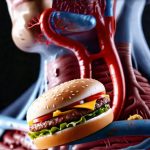The modern diet is often characterized by convenience, and for many, that translates directly into frequent consumption of fast food. While undeniably appealing in moments of busy schedules or cravings, regularly opting for burgers, fries, and sugary drinks can have a surprisingly significant impact on digestive health. One commonly reported consequence is the experience of soft stools – a frustrating symptom that signals an imbalance within the gastrointestinal system. This isn’t necessarily indicative of a serious medical condition but rather often points to dietary factors disrupting normal bowel function. Understanding why this happens, and how to mitigate it, can empower individuals to make informed choices about their eating habits and maintain better overall well-being.
The issue stems from several interconnected factors inherent in typical fast food offerings. These meals are generally low in fiber, high in fat, and often contain ingredients that can irritate the digestive tract. Fiber acts as a bulking agent in the intestines, helping to form solid stools and regulate bowel movements. Fat, while essential in moderation, can speed up digestion and potentially lead to looser stools when consumed in excess. Furthermore, many fast food items are processed with additives, artificial sweeteners, and large amounts of sodium, all of which can contribute to digestive distress. It’s a complex interplay between what we eat and how our bodies respond – and frequent fast food intake often throws this delicate balance off-kilter. Considering the impact of fast food on your system is important for long term health.
The Role of Dietary Fiber and Fat
Fiber is arguably the most critical component missing from many fast food meals. A diet deficient in fiber leads to several digestive consequences. Without sufficient bulk, stools become softer and more difficult for the intestines to move efficiently. This can lead to constipation, but paradoxically, it can also contribute to soft stools as the rapid transit time through the gut doesn’t allow enough water to be reabsorbed, resulting in looser consistency. – Good sources of fiber include fruits, vegetables, whole grains, and legumes. – Aiming for 25-30 grams of fiber per day is generally recommended, but most people fall far short when relying heavily on fast food. The lack of fiber isn’t the only culprit however; high fat content plays a substantial role. Understanding food combining can help mitigate these issues.
Fat’s impact on stool consistency is multifaceted. While some dietary fat is necessary for nutrient absorption and overall health, excessive amounts can overwhelm the digestive system. Fat stimulates bile production in the gallbladder, which aids in digestion but also has a laxative effect. This means that consuming large quantities of fatty foods can accelerate bowel movements, potentially leading to soft stools or even diarrhea. Moreover, some individuals have difficulty digesting certain types of fats, such as those found in fried foods, further exacerbating the problem. The combination of high fat and low fiber creates a perfect storm for digestive upset; the fat speeds things up while the lack of fiber provides no structure to slow things down and firm up stool consistency.
Finally, it’s important to consider the types of fats consumed. Fast food frequently utilizes cheaper, highly processed oils that are more difficult for the body to break down. Trans fats, in particular, have been linked to digestive issues and overall health problems. Choosing leaner protein sources and opting for baked or grilled options instead of fried can significantly reduce fat intake and improve digestive comfort.
Other Dietary Components & Digestive Sensitivity
Beyond fiber and fat, other components common in fast food contribute to soft stools. Sodium levels are often exceptionally high, drawing water into the intestines and potentially softening stool consistency. Artificial sweeteners, frequently found in sugary drinks and desserts, can also have a laxative effect in some individuals. These ingredients disrupt the natural balance of the gut microbiome—the community of bacteria living in our digestive system—which plays a crucial role in digestion and overall health. – A disrupted microbiome can lead to inflammation and increased sensitivity, making people more prone to experiencing soft stools after eating certain foods. If you experience frequent colds, consider digestive diagnostics as well.
Furthermore, many individuals have undiagnosed food sensitivities that are exacerbated by fast food ingredients. Lactose intolerance is a common example; the dairy products frequently used in burgers, milkshakes, and desserts can cause digestive distress for those who lack sufficient lactase enzyme to break down lactose. Similarly, gluten sensitivity or celiac disease can be triggered by the breading on fried chicken or burger buns. These sensitivities often manifest as bloating, gas, abdominal pain, and soft stools. Identifying and addressing these underlying sensitivities is crucial for improving digestive health. It may be useful to explore digestive panels if you suspect food sensitivities.
It’s also worth noting that frequent consumption of highly processed foods, like those found in fast food restaurants, can reduce the diversity of your gut microbiome over time. A less diverse microbiome is generally associated with poorer overall health and increased susceptibility to digestive problems.
Identifying Potential Triggers
Pinpointing the exact cause of soft stools after eating fast food requires some self-awareness and detective work. Keeping a food diary can be an incredibly valuable tool. For at least a week, meticulously record everything you eat, including specific details about the meal (e.g., burger with fries and a soda), as well as any accompanying symptoms like bloating, gas, or changes in stool consistency. This will help you identify patterns and potential triggers.
- Start by noting which fast food items seem to consistently cause problems. Is it always after eating fried foods? Or specifically after drinking sugary sodas?
- Pay attention to the quantity of food consumed. Overeating can overwhelm the digestive system, regardless of what’s being eaten.
- Consider the timing of symptoms. Do soft stools occur immediately after eating, or several hours later? This can provide clues about how your body is processing the food.
Once you’ve identified potential triggers, you can experiment with eliminating them from your diet one at a time to see if it makes a difference. For example, try switching from sugary sodas to water or unsweetened tea and observe whether your stools improve. This process of elimination is often more effective than trying to overhaul your entire diet at once. If meals feel heavy after eating, there are tests you can take.
Simple Dietary Adjustments
Even small changes in dietary habits can have a significant impact on stool consistency. Increasing fiber intake is paramount. – Incorporate fruits and vegetables into every meal, even if it’s just adding a side salad or snacking on an apple. – Switch to whole grain bread and pasta instead of refined grains. – Consider adding a fiber supplement (such as psyllium husk) to your diet, but be sure to drink plenty of water when doing so.
Reducing fat intake is also crucial. Choose leaner protein sources like grilled chicken or fish instead of fried options. Opt for baked potatoes over fries. And be mindful of portion sizes – even healthy fats should be consumed in moderation. Additionally, staying hydrated is essential. Water helps soften stools and promotes regular bowel movements. Aim to drink at least eight glasses of water per day.
When to Seek Professional Advice
While soft stools after eating fast food are often a temporary and manageable issue, there are times when it’s important to seek professional medical advice. If the symptoms are severe, persistent, or accompanied by other concerning signs such as blood in the stool, abdominal pain, fever, or weight loss, it’s essential to consult a doctor. These could be indicators of a more serious underlying condition.
- Irritable Bowel Syndrome (IBS) and Inflammatory Bowel Disease (IBD) can both cause similar symptoms, and require proper diagnosis and treatment.
- A healthcare professional can also help you identify any food allergies or intolerances that may be contributing to your digestive problems.
- They can also provide personalized recommendations for dietary changes and lifestyle modifications based on your individual needs and medical history. Don’t hesitate to reach out if you are concerned about your digestive health—early intervention is often the key to effective management. If you travel frequently, digestive diagnostics are recommended. Also, understanding why frequent burping happens can be helpful.


















